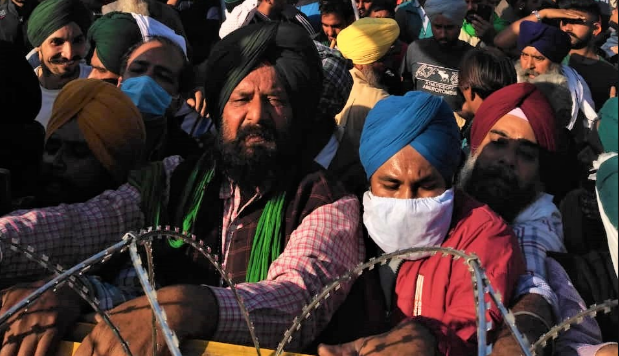
 Ratna
Ratna
New Delhi, November 28, 2020: Unwelcome metal barricades lining the border, swarms of policemen standing guard, water cannon being fired into the crowd despite a winter chill, tear gas shells being lobbed at will, relentless lathi charge at times.
The state has flexed its muscles as much as it could to try to snuff out the unarmed, peaceful demonstrators who have meandered towards the national capital to protest the new farm bills.
With its actions, the state has made its stance clear. It is ready to wage a war on its own people.
Who are these people who have come a long way to protest here? These are people who produce our crops, people who supply the food that keeps our bellies full so that we can live the good life in our so-called high-end cities.
These are our farmers – sidelined, marginalised and humiliated for years and now even more by the new state of affairs. As soon as the new farm bills were okayed, the farmers of our country decided that enough is enough, and set off towards Delhi.

Their mission? To meet the decision makers of the new farm bills, and ask them a simple question: What sense does it make to bring in rules that will allow only corporate powers to dictate terms to India’s poor farmers?
The state tried to stonewall in the initial days, keeping the demonstrators at bay with various tactics, before eventually bowing to pressure and allowing some sections of the larger movement to enter Delhi.
After discussion with farmer leaders, the protesting farmers have been permitted inside Delhi to hold peaceful protest at Nirankari Ground, Burari. Delhi Police appeals them to maintain peace @CPDelhi @LtGovDelhi @PMOIndia @HMOIndia #WearAMask #FarmersProtest#Unite2FightCorona
— Delhi Police (@DelhiPolice) November 27, 2020
For the farmers, it was a huge boost. The peaceful movement was beginning to pay off.
The state’s attempt to drag things and discourage the farmers didn’t work eventually. The farmers kept protesting peacefully, but they were as gritty as they come.
For folks in the city, it’s yet another unwelcome phase. People living in Delhi were annoyed, as usual. They are too busy to make sense of what’s happening. Too selfish to connect with the farmers protesting at their gates.
But by ignoring the ongoing movement, thinking it a problem of the ‘other’, they are making a fundamental mistake. City dwellers don’t realise that the protests against the farm bills will serve the larger interest of the entire population.
P Sainath was spot on when he wrote on his portal Rural India Online: “The crisis of the rural is no longer confined to the rural. Studies suggest an absolute decline in employment in the country between 2013-14 and 2015-16. The 2011 Census signalled perhaps the greatest distress-driven migrations we’ve seen in independent India. And millions of poor fleeing the collapse of their livelihoods have moved out to other villages, rural towns, urban agglomerations, big cities – in search of jobs that are not there. Census 2011 logs nearly 15 million fewer farmers (‘main cultivators’) than there were in 1991. And you now find many once-proud food-producers working as domestic servants. The poor are now up for exploitation by both urban and rural elites.”

Pandemic and Election
When the march to the national capital from various states of the country was planned and announced, Delhi Police had firmly said it won’t allow the farmers to gather due to fears of the Covid-19 pandemic.
Fair enough. The health crisis is plaguing the entire country with over 90 lakh people already infected.
But then why didn’t the police bother about stopping political leaders from campaigning before the Bihar election? Lakhs of people had come together, with party cadres working overtime arranging elaborate rallies.
What about the need for social distancing in that case? Wasn’t the pandemic around then too? Different rules for different people.
Despite warnings from the Election Commission regarding the pandemic situation, pre-election rallies were attended by lakhs of people, and all this wasn’t long back. Covid-19 became a matter of worry only when the protests came up.
The only time coronavirus actually featured during the Bihar election was when the opportunistic ruling party doled out campaign promises to distribute vaccines for free.
Pandemic and Protest
The Farm Bills 2020 were passed by the Lok Sabha on September 17, 2020 and by the Rajya Sabha three days later.
Countrywide, farmers are apprehensive about the potential damage from the three bills: Farmers’ Produce Trade and Commerce (Promotion and Facilitation) Bill, 2020, Farmers (Empowerment and Protection) Agreement on Price Assurance and Farm Services Bill, 2020, and Essential Commodities (Amendment) Bill 2020.

Farmers across India are alarmed that these bills will slowly and steadily hand over control over India’s agriculture scene from farmers to corporates.
And that is what made find a common cause, come together, and head straight into the capital, where the decisions were taken. The state doesn’t seem keen to roll back its move. And neither are the farmers, with their backs to the wall, going to step an inch back from their proud stance.








